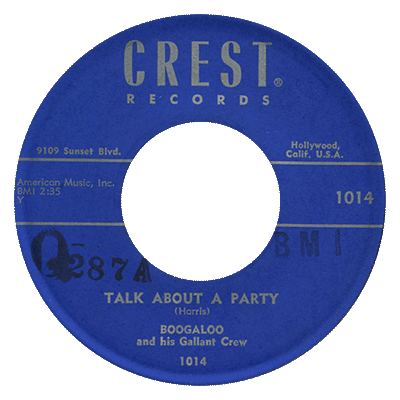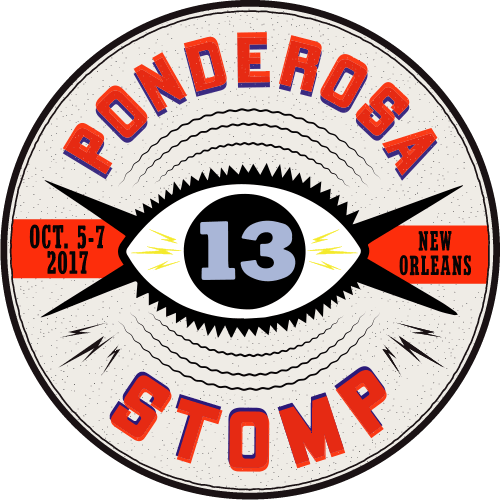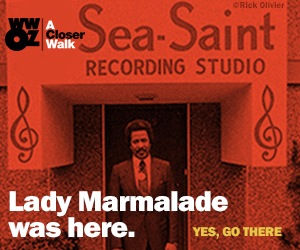You may not know his name, but rest assured you’ve heard Kent Harris’ songs.
The Coasters latched onto his slice-of-inner city-life vignette “Clothes Line (Wrap It Up),” which they retitled “Shoppin’ For Clothes.” Bo Diddley dug the boisterous “Cops And Robbers.” Veteran orchestra leader Les Brown and budding country star Roy Clark both romped through his rollicking “Talk About A Party.” In actuality, Kent wrote and waxed the original versions of all three, though you’d never know it from the artist credit gracing his 1956 renditions for Sylvester Cross’ L.A.-based Crest Records: Boogaloo and His Gallant Crew.
Just like his songs, Harris’ performing aliases displayed a decidedly humorous bent.
He’ll bring his delightful vocal stylings to this year’s Stomp, reliving some of his triumphs on the wild and woolly Los Angeles rhythm and blues studio scene of the 1950s and ‘60s. Though his handful of vocal efforts were truly inspired, Harris eventually gravitated to a behind-the-scenes role as a songwriter, producer, and label owner.
Born in Oklahoma City in 1930, Harris hailed from a musical family that relocated to San Diego in 1936. “All my sisters were all singers,” he says. “Betty was the oldest, Dimples was the next, and Beverly was the youngest.” Marcene “Dimples” Harris made show business her life.
“When she was a little girl, we started calling her Dimples, and that stuck,” says Harris, who took his initial musical cues from his lovely piano-playing sister. “After I finished high school, I went into the Air Force. Then I went to Japan for four years overseas. Came out, and then she was playing nightclubs around town there. She was working, she was doing pretty good,” says Kent. “I played vibes in a small band with my sister. It was my sister’s band, and she taught me vibes and how to play ‘em because she wanted me to be a part of it. But she’s the one that really got me going.”
Popular R&B deejay Hunter Hancock helped Dimples get a foothold on the L.A. circuit. “He was the number one jockey in Los Angeles, and he did a lot of things with ‘em, had ‘em on different shows and stuff that he was doing,” says Kent. Dimples made her first platter for Savoy’s Regent subsidiary in 1951, and her brother took the plunge into the music business after he returned stateside. “She got a deal recording for a company called Trend Records,” says Kent. “She got a contract with them as a singer, so then she wanted me to sign with ‘em too.”
Albert Marx’s L.A.-based Trend label was generally associated with West Coast jazz, but the Dimples Harris Combo made a pair of singles for his firm. Out during the spring of ‘54, the first split the vocals evenly between Dimples (“Hey, Mr. Jelly”) and Ducky Drake, the first of Kent’s whimsical performing sobriquets, singing “1992.” “That was a name Dimples gave me,” he says. “I said, ‘Kent Harris, nobody likes that name!’ So she said okay. She told me, ‘Why don’t you be Ducky Drake?’ And I said, ‘Oh, now that sounds good. Okay, I’m Ducky Drake!’ So we recorded with that name.” Ducky sang the grooving blues “Saint Or Sinner” on their shared Trend encore release later that year, Dimples belting “Long Lean Lanky Juke Box.”
Kent’s songwriting instincts surfaced early. “I started doing that when I was just a kid,” he says. “I started off around the neighborhood where I lived. There were a lot of kids around there, playing around and stuff. And I used to make up songs about ‘em, make up different songs about different ones and the stuff they do. Everybody kind of liked it. It was a fun thing, and I just kept on doing it until I got a break.” Dimples helped her big brother get started in the songwriting field as well.
“She got me a contract with a publishing company. The company was owned by some big guys. Gene Norman, he was a big jazz promoter. He had this publishing company. He signed me to it.” Harris really found his niche at Sylvester Cross’ American Music. In addition to owning the publishing house where Harris wrote several of his classic songs, Cross operated Crest Records, its headquarters situated at 9109 Sunset Boulevard at the west end of the Strip.
“Crest Records, they were a small company,” says Kent. “I had a whole lot of fun there.”
Someone at Crest thought as much of Kent’s singing as they did his songwriting. “I wasn’t really a singer then. I was really just a writer. But then they liked the way I was singing ‘em. They said, ‘Well, we’d rather for you to sing ‘em,’ than the people who I was writing for. So I wound up singing ‘em.” Dimples was there too. Her vocal group-backed “This I Do Believe” directly preceded “Talk About A Party,” Kent’s first Crest outing as Boogaloo and His Gallant Crew, waxed in May of 1956 with tenor saxist/labelmate Freddie Simon leading the backing band.
Long before anyone invented a dance called the Boogaloo, Harris utilized the distinctive handle. “As kids, we used to call each other different funny names, you know. And they were calling me that. So that one stuck to me. So I said okay. But I never thought I would wind up using it,” he says. “That was another name that I used to put on those songs because I didn’t really like or want to use my name, Kent Harris. So I decided to use that name.”
Kent’s animated vocal on the rip-roaring “Talk About A Party” was a delight as he vividly described a wild shindig. Where did he find inspiration for its creation? “Probably working in the club or something, me and my sister,” says Harris. For the flip, Kent wrote another blazing rocker, “Big Fat Lie.”
Harris had major label competition from a most unexpected cover source. Best known for his nearly five decades of service as Bob Hope’s orchestra leader, Les Brown wasn’t exactly an ideal candidate to pound out rock and roll for Capitol. Yet he and his Band of Renown gave it their best shot on “Talk About A Party,” singer Butch Stone delivering a noticeably milder version of the colorful storyline.
It wasn’t the Harris family’s first experience with Capitol. Through Gene Norman, the Harris Sisters—Dimples, Betty, and Beverly, operating as a vocal trio–had waxed “Kissin’ Bug” for Capitol A&R man Dave Cavanaugh in 1955. Country guitar dazzler Roy Clark revived “Talk About A Party” for Capitol during a ‘62 flirtation with R&B material. “I heard about that,” says Kent. “Never did get a copy of it.”
In October of ‘56, Boogaloo and His Gallant Crew cut their Crest encore, each side presenting a hip, hilarious musical playlet with solid backing from pianist Ernie Freeman’s combo. “Clothes Line (Wrap It Up)” was set in a funky little shop where Boogaloo lusts after a fancy new suit with less than optimal results. How did this remarkable number come to be?
“Just foolin’ around, I guess, looking at some magazines, Esquire and all of the men’s magazines. I just started writing about clothes,” says Kent. “It just kind of started off, and it was kind of funny, so I added some more to it and kept adding to it. All of a sudden, I had a song.”
The Coasters later revived “Clothes Line,” producers Jerry Leiber and Mike Stoller claiming that lead singer Billy Guy brought a few lines of the song into the studio and they fleshed it out from there. They transformed it into a dialog between customer Guy and a cool salesman portrayed by bass singer Will “Dub” Jones. The vibe was jazzier, decorated with King Curtis’ moody sax. When Atco Records pressed up the retitled “Shoppin’ For Clothes” (a minor pop hit in 1960), Leiber and Stoller were credited as composers under their own pseudonym of Elmo Glick. Kent received no mention at all.
“I think Leiber and Stoller got a hold to it, and they fell in love with the song,” he says. “So they changed it around a little. They slowed it down and did a couple of things with it. So then the next thing I know, it came out on Atlantic Records with the Coasters. So I just got in touch with ‘em. As soon as I told them that I’m still around, they said that they didn’t even know that I was around anymore. I hadn’t seen ‘em in years. So they said, ‘Well, man, we’ll straighten that out immediately!’ So they stuck my name on it.” A later Atco pressing of the Coasters single shows the title properly restored to “Clothes Line (Wrap It Up),” Harris’ name replacing those of the famed producers as its sole author.
“Cops And Robbers,” the other side of Boogaloo and His Gallant Crew’s Crest encore, was no less lyrically detailed. This time friendly Kent’s the victim of a carjacking by a would-be bank robber. Despite the edgy subject matter, it’s hilarious. “That’s just another one of those, just playin’ around as a kid, writing funny stuff with my friends and cracking up laughing at it,” he says.
Immediate competition came from a cover by one of Chicago’s finest young bluesmen. “Next thing I know, Bo Diddley had got hold to it,” says Harris. “He recorded it, and they came out with it.” Checker Records got the writer’s credit right on Bo’s single, although they backslid on a subsequent pressing by listing no composer at all and mistakenly assigning the song to Arc Music, Chess’ publishing arm.
Outside opportunities conspired to break up the Harris Sisters. Beverly began filling in for the Platters’ Zola Taylor on the road. “She traveled around the world with them,” says Kent. Betty met comic Redd Foxx, then churning out a steady stream of under-the-counter product for Dootone Records and a long way from starring in TV’s Sanford and Son. “They got married, so he kind of wanted her to stay home more,” says Harris.
Dimples wed bassist Harold “Hack” Jackson, an ex-Treniers sideman and former co-leader of the Jackson Brothers, who had recorded jump blues for RCA Victor. She played organ in his new outfit, Harold Jackson & the Tornadoes, when they recorded for Aladdin in 1957, and she made a ’60 solo single for Gardena as Dimples Jackson. The couple made later 45s for Dena and their own Octive logo.
Kent dropped back by Crest at the dawn of the ‘60s to revive the typically comedic blues chestnut “How Come My Dog Don’t Bark,” this time calling himself Roscoe Sculley, but his focus by then was largely behind the scenes. “I started producing first. I said, ‘I’ll produce.’ After I was a writer. I said, ‘Matter of fact, as producer I can make more money,’” he reasons. “So when I got to the producing, I said, ‘Maybe I could make more money if I had a record company too.’ So I said, ‘Well, I’ll start a little record company.’ But it was just something to start out with. I wasn’t really into it that much. It was just a way to get things started with my singers, because by then I was signing other singers.”
Among his finds was former Stomp star King Hannibal (real name: James Shaw), who he produced in 1958 for the tiny Concept label (Imperial soon picked up his rocking “Big Chief Hug-Um An’ Kiss-Um,” written by Kent and Shaw). “He came into L.A. from Georgia. He came out here looking to try to make it big in Hollywood or something, to be a star. He was trying to be a singer,” says Kent. “They had a little talent show, and I was there.” Harris claims co-authorship with Hannibal on Eugene Church’s “Good News,” but Rendezvous Records credited it to Church. “That was a bummer. The name of the song was ‘We’re Gonna Rock A Little While.’ That was the name of the song when I wrote it,” he says. “But they changed the name of it and stuck it out there. Next thing I know, it was breaking big.”
There were the Scott twins, Walter and Wallace, singing in 1961 with a doo-wop unit called the Utopians (later they’d form the Whispers). “When I met ‘em, they were living in Compton, and they were just kids,” he says. “I took ‘em to Hollywood and got ‘em a contract with Imperial Records.” Harris played a part in the discovery of future Motown diva Brenda Holloway, in her mid-teens when he came across her in ‘62. “I used to go over to her house and sit at the piano with her,” he says. “We’d be hashing stuff out. And the next thing I know—well, I got her a recording contract with a company called Del-Fi Records, and we cut about three or four records with them.”
Perhaps the best-known of Kent’s free-lance productions was the Duals’ instrumental “Stick Shift,” a #25 pop hit in 1961 on Juggy Murray’s New York-based Sue logo. “‘Stick Shift’ was a couple kids that I got, found over there in South Central Los Angeles,” Harris says. “They played guitar. So I took ‘em into the studio and recorded ‘em. Then I took ‘em to H.B. Barnum, who had a company called Little Star. He added a couple things to it and sold it to Sue Records.” Sue proved receptive to another Harris discovery, organist Hank Jacobs, whose instrumental “So Far Away,” co-written and produced by Kent, made a blip on the pop hit parade in early ’64.
http://www.youtube.com/watch?v=t5GyvV1-8Hs
Kent founded his Romark label in 1960, named after his son. Romark pressed up fine L.A. R&B by the Phillips Sisters, the Mighty Hannibal, the Lon-Genes, Donoman, Cry Baby Curtis (the last pair were the same singer, Curtis Payne), the Lon-Genes, Ray Agee, Jimmy “Preacher” Ellis, ex-Coasters guitarist Adolph Jacobs, the ever-popular Dimples, and Ty Karim, Kent’s most important discovery from a personal perspective. Besides waxing some fine soul sides, Ty was romantically involved with Kent, giving him twins. Their daughter Karime has followed in her late mother’s singing footsteps.
Dimples’ death in 1976 dealt Kent a serious blow. “When she passed away, then things kind of slowed down for me. I kind of lost interest in everything, because she was everything. She was my whole backbone and everything to me. When she passed away, man, I dropped out. And then eventually, I opened my own record store. I said, ‘I’m just gonna own a store.’ I kind of got away from writing music. And then my store seemed to catch on good, and then I started opening another one and another one. I opened about five of ‘em, and I had those about eight or nine years,” he says. “Then I stepped out of the music game for awhile, but I came back.”
This year’s Stomp attendees, many of them no doubt familiar with Ace’s splendid recent CD overview Kent Harris’ R&B Family, will certainly be glad of that. “I never thought this would happen,” says Kent. “I didn’t know all of this was going to happen, that people would start liking those songs!”
Kent Harris plays at the Ponderosa Stomp Saturday, October 5th 2013 at 8:45PM.








